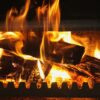Fireplace Fuels: Making the Best Choice for Vienna, VA Homes
A fireplace is not just an attractive feature for your home – it’s a functional tool that can provide warmth, ambiance, and even save on heating costs. However, the choice of fuel for your fireplace greatly influences its performance, efficiency, and maintenance needs. A&T Chimney Sweeps fireplace, furnace, dryer vent, gutter cleaning, and repair services in Vienna VA, acknowledges that homeowners in Vienna, VA, may have an arduous task choosing the right fireplace fuel. This article aims to provide comprehensive information to help you make an informed decision.
Wood Burning Fireplaces
For many homeowners, nothing matches the crackle, scent, and warmth of a wood-burning fireplace. Wood is a renewable resource and is relatively inexpensive, especially if you have access to free wood in your locality. It also provides substantial heat output.
However, wood-burning fireplaces require routine maintenance to prevent creosote build-up, which can lead to chimney fires. Additionally, they produce smoke, contributing to air pollution, and may not be the best choice for individuals with respiratory issues.
Gas Fireplaces
Gas fireplaces are a popular choice for many homeowners due to their convenience and cleanliness. They require minimal maintenance, emit fewer pollutants, and are easy to operate – often with just the flip of a switch.
Natural gas and propane are the two main types of gas used in fireplaces. Natural gas is often less expensive and burns cleaner, while propane provides more heat per unit.
While gas fireplaces don’t provide the traditional fireplace experience, they offer many advantages, including consistent heat output and no need to store and haul wood.
Electric Fireplaces
Electric fireplaces offer a modern, eco-friendly solution. They are incredibly convenient, requiring only an electrical outlet to operate, and produce zero emissions. They also offer safety features, such as automatic shutoffs and cool-to-touch glass.
However, electric fireplaces may not provide enough heat to warm larger rooms, and they lack the authentic flame experience. Moreover, they can drive up your electricity bill, especially when used extensively.
Pellet Fireplaces
Pellet fireplaces burn small pellets made from compressed sawdust or other organic materials. These fireplaces are efficient, produce little ash, and the pellets are easy to store.
However, pellet fireplaces require electricity to operate the built-in fan and auger, which can be a disadvantage during power outages. The initial cost of pellet stoves and the pellets themselves can also be higher than other fuel options.
Bioethanol Fireplaces
Bioethanol fireplaces are a relatively new entrant to the market. They burn bioethanol fuel, which is made from fermented plant and grain extracts. These fireplaces are smokeless, require no venting, and are easy to install.
However, bioethanol fireplaces tend to have a lower heat output than other fireplaces. Also, the cost of bioethanol fuel can be higher than other fuels.
In conclusion, the best fireplace fuel for your Vienna, VA home depends on various factors, including your budget, maintenance preference, environmental concerns, and desired ambiance. Whether you choose a traditional wood-burning fireplace, a convenient gas or electric fireplace, or a modern bioethanol or pellet fireplace, ensure that it is professionally installed and maintained to prolong its lifespan and ensure safety.
FAQs
1. Which is the most environmentally friendly fireplace fuel?
Electric and bioethanol fireplaces are considered the most eco-friendly as they produce zero emissions.
2. Which fireplace fuel provides the most heat?
Wood and propane generally provide the most heat output.
3. What is the most cost-effective fireplace fuel?
The cost-effectiveness of fireplace fuels depends on several factors, including local fuel prices and the efficiency of your fireplace. Typically, natural gas and wood are considered the most cost-effective options.
4. How often should a fireplace be serviced?
Regardless of the type of fuel used, it is recommended to have your fireplace professionally inspected and serviced at least once a year.
5. Can I switch fireplace fuels?
Yes, it’s possible to switch fireplace fuels, but it usually requires a conversion kit or a new fireplace insert. Always consult with a professional, such as A&T Chimney Sweeps, before making modifications to your fireplace.
6. Are ventless gas fireplaces safe?
Ventless gas fireplaces are generally considered safe when used properly. However, they should be used as supplemental heat sources and not as the primary heat source in a home. Regular maintenance and inspections are essential to ensure their safe operation.
Remember, no matter the type of fireplace or fuel you choose, regular maintenance is key. A&T Chimney Sweeps offers a range of services, including fireplace, furnace, dryer vent, gutter cleaning, and repair services in Vienna, VA to help you maintain a safe and efficient fireplace.








